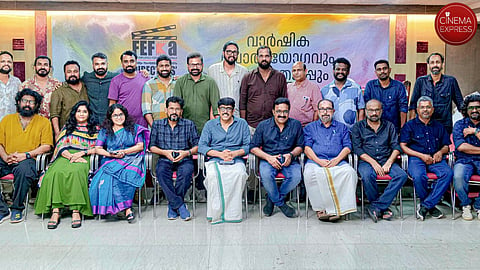

The Film Employees Federation of Kerala (FEFKA) Directors Union has strongly criticised the growing narrative that Malayalam cinema is responsible for recent violent crimes in Kerala. In an official statement released on Tuesday, the union condemned such claims as “overly simplistic” and “misleading”, asserting that violence is rooted in deeper socio-economic and psychological factors rather than cinematic portrayals.
The statement was issued in response to concerns raised by political leaders, law enforcement officials, and social commentators, who have suggested that certain crimes were inspired by violent Malayalam films. The union refuted this argument, stating that “violence is not a spontaneous act triggered by films but is shaped by long-standing social conditions, economic insecurities, alienation and marginalisation.”
A key example cited in the statement was the recent backlash against Marco, the Unni Mukundan-starrer accused of glorifying violence. Similar accusations were previously levelled against films like Anjaam Pathiraa and Drishyam franchise, which were claimed to have influenced real-life crimes. FEFKA, however, dismissed these allegations, arguing that “films derive their themes from existing social realities, reflecting rather than creating societal conditions.”
The union also highlighted the increasing influence of foreign content, particularly from Japan and Korea, which frequently contains extreme violence but does not correlate with high crime rates. “Japan has one of the lowest crime rates globally due to its robust legal system and social security frameworks,” the statement pointed out, questioning why only Malayalam cinema is being singled out.
FEFKA further criticised demands for stricter censorship, calling them “authoritarian” and warning that such measures would ultimately “empower fascist tendencies.” Drawing comparisons to past controversies, the statement questioned whether those advocating for rigid artistic controls would “justify religious fundamentalists banning Salman Rushdie’s books” or believe that “M Mukundan’s literature introduced Malayali youth to drugs.”
Addressing the issue of increasing drug use in educational institutions, the union expressed disappointment in student organisations for failing to tackle the crisis. “Rather than engaging in critical self-reflection, some prefer the comfort of scapegoating cinema,” the statement read.
While acknowledging that the commodification of violence in certain films deserves scrutiny, FEFKA reaffirmed its commitment to “democratic discussions” on the subject. The statement concluded by emphasising that “cinema ultimately stands on the side of humanity.”